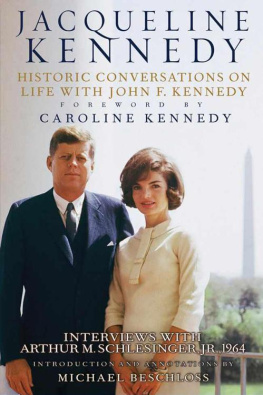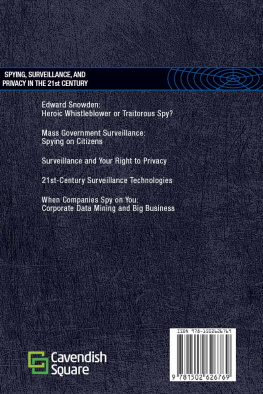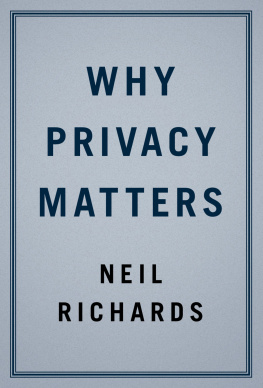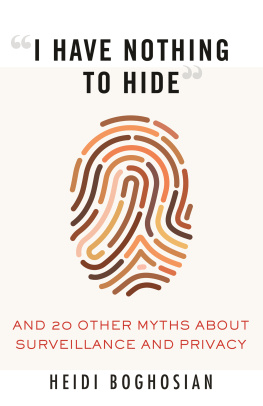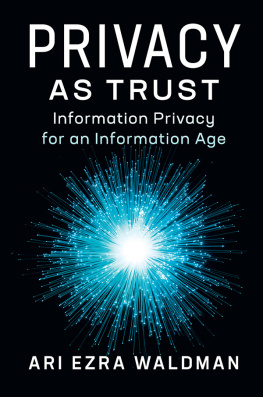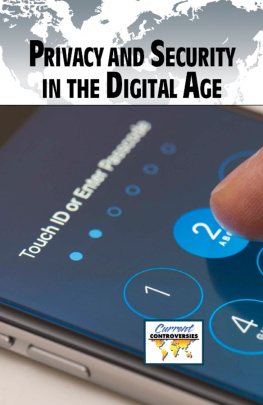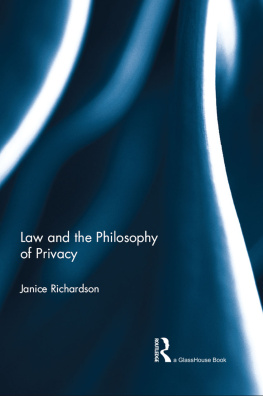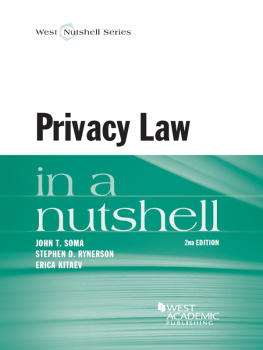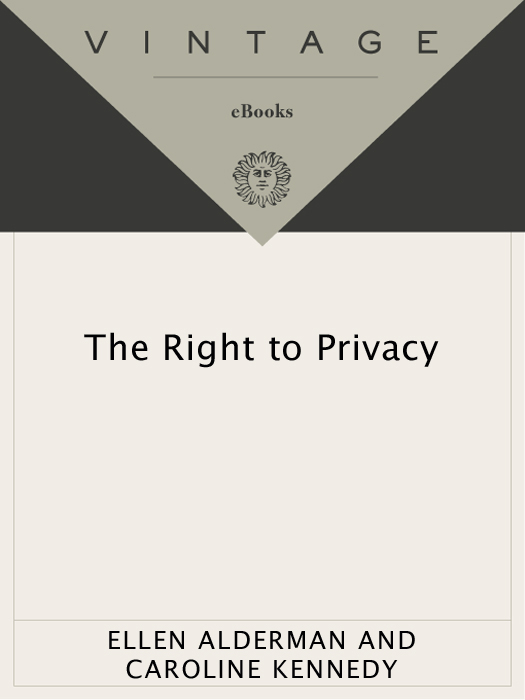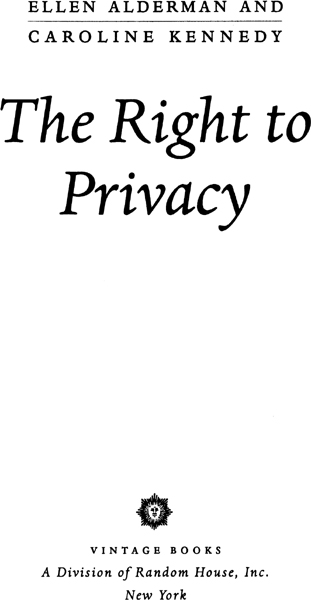Acclaim for
ELLEN ALDERMAN AND
CAROLINE KENNEDYS
The Right to Privacy
A fascinating book that contains a wealth of information about everyday, ordinary citizens and what they should know about the law and their rights. Eye-opening.
Ann Landers
[Alderman and Kennedy] have a flair for telling human detail, making each case a riveting drama. The Right to Privacy will open your eyes to the countless ways in which the most sacrosanct corners of our lives may be invaded.
Chicago Tribune
These are the cases brought by individuals with whom we can all empathize. In this, Kennedy and Alderman bring home how intense and distressing is the pain from invasions of privacy. By concentrating on the victims of physical intrusions, press coverage, biotechnology and videotaping, Kennedy and Alderman have found their niche.
Boston Globe
One of the many virtues of The Right to Privacy is that it makes us feel in our gut the downside of the view that loss of privacy builds a stronger community. [Alderman and Kennedy] persuade one that, on the whole, privacy is losing ground against public access, and we, as a society, should reexamine the balance Their book stands tall as a thought-provoking rebuke to all who view intrusion on others too casually.
Newsday
With its vivid case studies and accessible legal explanations, [The Right to Privacy] is a powerful indictment of a Peeping Tom society The real-life stories at the heart of the book are gripping. Fast-paced and engaging.
Vogue
To William
To Ed
Contents
Acknowledgments
T HERE ARE many people we would like to thank. Most importantly, we are indebted to those who were gracious enough to speak with us about their experiences, especially those who did so in spite of the personal pain it caused them to retell their stories. We would also like to thank their attorneys for their time and assistance.
Along the way, many people helped us at various stages, particularly our endnote researcher, Mindy Meade, and our editorial assistant, Svenja Soldovieri. We are also grateful to Maxine Rosenthal, Ilse Thielmann, and Aitken Thompson.
For crucial back-up support, we are indebted to Elaine Kennelly, Marta Sgubin, and Kristen Robinson. As they always do, our friends Arthur Cohen, Nicole Seligman, and Mark Geistfeld once again came through.
We feel particularly fortunate to have had the intelligence, judgment, and support of our editor, Peter Gethers, and our agent, Esther Newberg.
Finally, we would like to thank LEXIS/NEXIS for their generous support.
The following people were kind enough to speak with us:
Privacy v. Law Enforcement
Mark Beem, Richard Brzeczek, Peter Carey, Ted Choplick, Carol D., Lois Dejulio, Linda Fairstein, Frank Farfalla, Diane H., Harold Haley, John Klein, Lois Lipton, James McCarthy, Alan Nodes, Jody P., Linda P., Lisa P., Paul Schectman, Ted Stein, Mary T., Bruce Viania, Joan W, Jim Wheeler
Privacy and Your Self
Catherine Albisa, Mark Barnes, Vincent Burke, Sidney Callahan, Jay Christenberry, Charles Clifford, Brenda Davis, J. R. Davis, Maria Hassner, Mitchell Holtzman, Nan Hunter, Dr. I. Ray King, Madeleine McDowell, Barbara Mishkin, Leslie Moore, Lynn Paltrow, Timothy Quill, William Rubenstein, Mark Scherzer, Dan Stoner, Nettie Stoner, Sherri Stoner, Mary Stowe, Dr. Alan Weingold, Judge W. Dale Young
Privacy v. The Press
Clarence Arlington, Floyd Abrams, Marlene Belloni, Tom Belloni, Steve Bouser, Ed Braun, Jeannie Braun, Tom Capra, Ann Edgerton, Mitch Ezer, Larry Flynt, George Freeman, Mary Hall, Susie Hall, Alan Isaacman, Edward Klein, Ken Kulzick, Joe Millsaps, Ruben Norte, Rose Post, Jack Price, Hugh Stevens
Privacy v. The Voyeur
Debbie Anderson, Faye Anderson, Ken Burch, Barry Chasnoff, Jeff Cooper, Ron Krist, Peter McCall, Richard Morrison, Terry Nelson, Tom Riley, Keith Stapleton
Privacy in the Workplace
Judy Bain, Gail Dorn, Mica England, Karen Grabow, Ruth Harlow, Dorothy Kirkley, Bill Kirkpatrick, Rick Kranz, Lewis Maltby, Mike Lindsay, Jim Martin, King Rogers, Brad Seligman, Fran Shahar, Robin Shahar, Noel Shipman, Alana Shoars, Ann Smith, Sibi Soroka, Arthur Spitzer, Sheilah Stewart, Bob Sykes, Evan Wolfson
Privacy and Information
John Perry Barlow, Jerry Berman, Ira Glasser, Jan Lori Goldman, Evan Hendricks, Gary Marx, Eli Noam, Marc Rotenberg, Harvey Silverglate, Robert Ellis Smith
Authors Note
A LTHOUGH the names of the people whose cases appear in this book are part of the public record, we have chosen to alter or delete some of them to protect the individuals privacy. Because our primary goal was to explain the principles of law underlying the various aspects of the right to privacy, we offered to change the names of people with whom we spoke. In the few instances when they accepted, we have done so. We have also deleted or changed the names of some people we did not speak with, particularly those who had filed suit for invasion of privacy.
Introduction
T HE WORD privacy does not appear in the United States Constitution. Yet ask anyone and they will tell you that they have a fundamental right to privacy. They will also tell you that privacy is under siege. We wrote this book to explore why people believe so strongly in the right to privacy, and what the legal system does to protect it, even though the right is not mentioned in our charter of freedom.
The issues are especially vital today as more and more of our privacy is stripped away. Private individuals join public figures in decrying tabloid journalism and complaining that the press can invade lives with impunity. Pro-choice advocates argue that a womans right to make fundamental decisions is threatened by a hostile and intrusive government. Increasing concern about crime and terrorism, and calls for stricter law enforcement, have led to measures expanding the authority of police to enter our homes, search our belongings, and intercept our communications. And the notion that information can be kept secret to any degree may simply vanish in cyberspace.
Why we as Americans so cherish our privacy is not easy to explain. Privacy covers many things. It protects the solitude necessary for creative thought. It allows us the independence that is part of raising a family. It protects our right to be secure in our own homes and possessions, assured that the government cannot come barging in. Privacy also encompasses our right to self-determination and to define who we are. Although we live in a world of noisy self-confession, privacy allows us to keep certain facts to ourselves if we so choose. The right to privacy, it seems, is what makes us civilized.
Our own views on the subject evolved considerably during the time we worked on this book. As authors, we came to the subject with very different experiences, though with similar legal training as attorneys. One of us is a public figure who grew up with little privacy. The other is like the people in this book who, until recently, had taken the right to privacy for granted.
We began our research with the same gut reaction that most people have: there is less privacy than there used to be. As we immersed ourselves further in the topic, reading privacy cases and talking with people who had tried (and often failed) to vindicate their loss of privacy through the legal system, we concluded that things were worse than we originally thought. We came to realize that the general erosion of privacy is no longer affecting only well-known public personalities. Now, private individuals face a similar loss of privacy, and it is these people who are shaping the law. Whether it be the disclosure of intimate details about a persons life or interference with private decisions, there is a growing sense that all of us, well known and unknown, are losing control.


